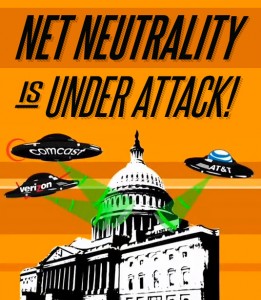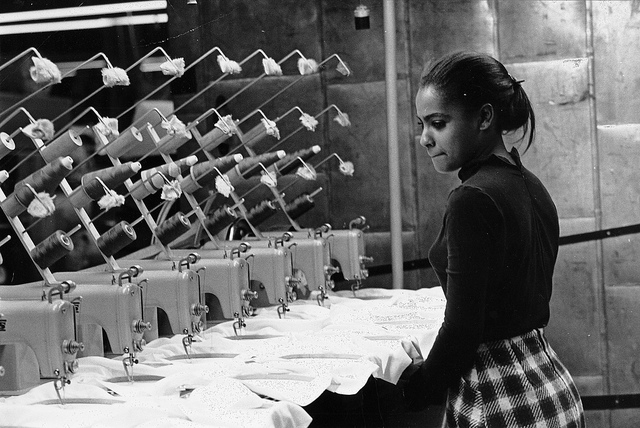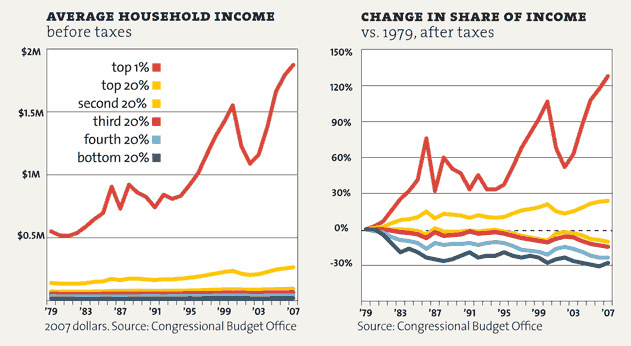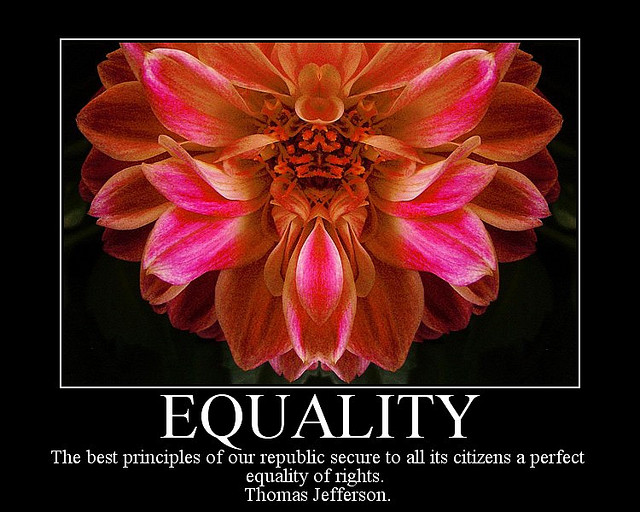“Freedom of communication with any application to any party is the fundamental social basis of the Internet, and now is the basis of the society we’ve built on the Internet.” — Tim Berners-Lee
Thanks to Stephanie Crets and the folks at singlehop.com, we are happy to add the following material to our conversation about the importance of net neutrality, the only thing making sure that all voices, big and small, are heard.
As always, your comments are welcome.
(This poster is not original to the article, however.)

Free Press
Flickr/creative Commons
********
A Neutral Guide to Net Neutrality
Net Neutrality has been the topic of intense conversation recently, as the FCC solicits and considers public comments about how to regulate Internet traffic. We’ve put together the overview below to help you understand the issues and players that influence the way we use the Internet daily for business, research, entertainment, and social activities.
Net Neutrality Overview
Net Neutrality refers to the idea that all data on the Internet should be treated equally by Internet Service Providers (ISPs). For most of the Internet’s history, ISPs generally did not distinguish between the various types of content that flow through their networks, whether web pages, email, or other forms of information. In the 1990s and early 2000s, the few ISPs that tried to block certain types of data faced strong opposition from consumers, tech companies, and regulators.
With the rise of bandwidth-heavy services such as Netflix, ISPs have increasingly sought to sell more bandwidth, or “fast lanes,” to companies willing to pay for it. Other traffic would move through their networks at a slower pace.
An FCC History of Net Neutrality
The term “Network Neutrality” (later shortened to Net Neutrality) was coined by legal scholar Tim Wu in a 2003 study of potential ways to regulate the Internet. Over the last decade, the FCC has tried multiple times to enforce “guiding principles” in support of Net Neutrality.
In 2007, the FCC ruled that Comcast had illegally throttled its users’ service, but the ruling was struck down by the D.C. Circuit of the U.S. Court of Appeals.[1] In 2010, the FCC passed a regulatory order intended “to preserve the Internet as an open platform for innovation, investment, job creation, economic growth, competition, and free expression.”[2] Verizon Communications challenged the new rules in court, and in January 2014, the D.C. Circuit again struck down the FCC’s ruling.[3]
In response to the most recent ruling, the FCC proposed another rulemaking and solicited public comments through July 15, 2014, with a reply comment period through September 10, 2014. During that period, members of the public can comment by visiting www.fcc.gov/comment or emailing openinternet@fcc.gov.[4]
Arguments for Net Neutrality
Net Neutrality proponents argue that the Internet should provide a “level playing field” by codifying an open-access model of the Internet in which all data is treated equally. In support of Net Neutrality, Tim Berners-Lee, inventor of the World Wide Web, has stated, “Freedom of communication with any application to any party is the fundamental social basis of the Internet, and now is the basis of the society we’ve built on the Internet.”[5]
Responding to opposition against government regulation, supporters of Net Neutrality argue that regulation is necessary to preserve the previously voluntary open access. Some have equated such regulation as similar to the First Amendment, and Senator Al Franken has called Net Neutrality “the most important free speech issue of our time.”[6]
Replying to concerns about interference with the free market, Net Neutrality advocates argue that 96% of Americans have access to two or fewer wired broadband providers,[7] which means that there is very little ISP competition now. Network Neutrality rules, they contend, would prevent ISPs from suppressing competitors and inhibiting startup companies such as YouTube, which started as a small company competing with Google Video before Google bought it in 2006.
Arguments Against Net Neutrality
Opponents of Net Neutrality regulation argue that ISPs should be allowed to charge more for bandwidth-intensive services that heavily use the Internet’s infrastructure. Offering tiered service, they add, will allow consumers to receive faster traffic for high-demand services, such as multimedia streaming, video conferencing, and cloud-based IT.
Other opponents of Net Neutrality rules argue from a libertarian perspective, asserting that the government should refrain from interfering with the Internet. Some have likened regulation of an open Internet to the institution of common carrier locomotive transportation laws in the late 19th century, which they claim subsequently raised prices and degraded service.[8] Christopher Yoo, a legal professor at the University of Pennsylvania, has argued that common carrier regulation has historically been poorly implemented, and similar rules should be avoided with respect to the Internet.[9]
In response to claims that tiered service will hinder innovation and discourage competition, Net Neutrality opponents claim that regulations will suppress creative, free-market solutions that might otherwise emerge.
The Future of Net Neutrality
Arguments supporting and in opposition to Net Neutrality proceed in a variety of places — online, through traditional media, in political venues, and elsewhere. People on each side position themselves as champions of freedom and innovation, while companies and organizations lobby rulemakers in Washington, D.C..
Meanwhile, companies continue wrangling over how high-bandwidth services should be delivered over the Internet. In February, Netflix saw a slowdown in its service as it tried to negotiate connection fees with broadband providers such as Verizon and Comcast,[10] an event later used by Net Neutrality proponents as an example of ISPs limiting other companies’ service to get what they want — although others have argued that the event had nothing to do with Net Neutrality.[11] Net Neutrality supporters have noted that in 2013, Comcast spent more than $18 million on lobbying efforts, more than any other single company except defense contractor Northrop Grummon.[12]
In April 2014, a set of rules proposed by FCC Chairman Tom Wheeler, a former lobbyist for cable and wireless companies, indicated that the FCC may abandon its previous Net Neutrality position and consider letting ISPs provide tiered service. Wheeler denied that the proposed rules changed the FCC’s position,[13] but more than 100 companies supporting Net Neutrality wrote a letter to the chairman in May criticizing the proposed rules.[14]
Whatever rules the FCC eventually establishes, they will have a great impact on how we continue to use the Internet in our personal, professional, and political lives. Understanding the issues and players involved is important to anticipating the how clients, service providers and even competitors will respond.
Footnotes:
1. https://www.eff.org/files/Comcast%20v%20FCC%20(DC%20Cir%202010).pdf
2. https://apps.fcc.gov/edocs_public/attachmatch/FCC-10-201A1.pdf
3. http://arstechnica.com/tech-policy/2014/01/how-the-fcc-screwed-up-its-chance-to-make-isp-blocking-illegal/
4. http://www.fcc.gov/document/fact-sheet-protecting-and-promoting-open-internet
5. https://www.youtube.com/watch?v=Jev2Um-4_TQ#t=11
6. http://www.huffingtonpost.com/al-franken/the-most-important-free-s_b_798984.html
7. http://www.broadband.gov/plan/4-broadband-competition-and-innovation-policy/
8. http://www.cato.org/blog/fccs-net-neutrality-rules
9. http://papers.ssrn.com/sol3/papers.cfm?abstract_id=2370068
10. http://online.wsj.com/news/articles/SB100014240527023048997045793912 23249896550
11. http://www.cnet.com/news/comcast-vs-netflix-is-this-really-about-net-neutrality/
12. https://www.opensecrets.org/lobby/top.php?showYear=2013&indexType=s
13. http://www.nytimes.com/2014/04/24/technology/fcc-new-net-neutrality-rules.html?_r=0
14. http://online.wsj.com/news/articles/SB100014240527023037013045795483 64154205126
Read more at http://www.singlehop.com/blog/a-neutral-guide-to-net-neutrality/#bVqjugyWdkAZV3cW.99











